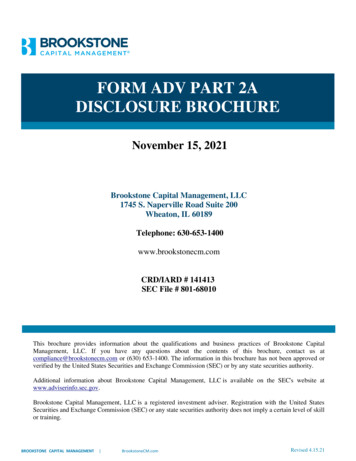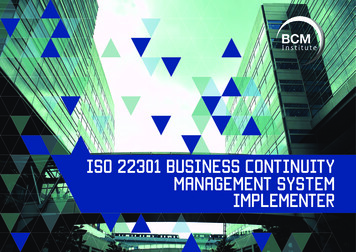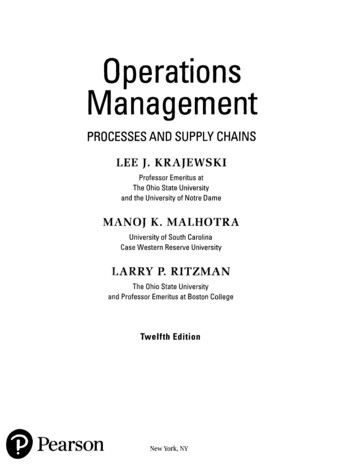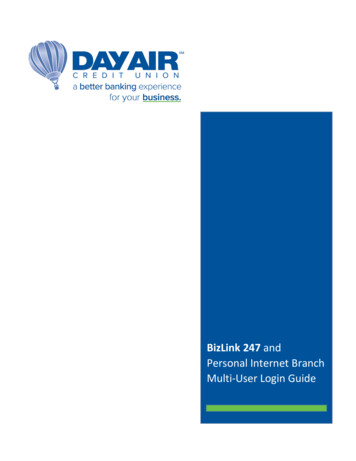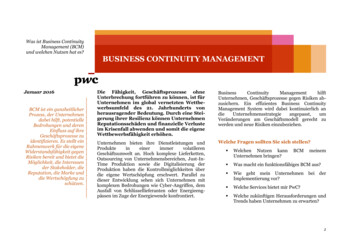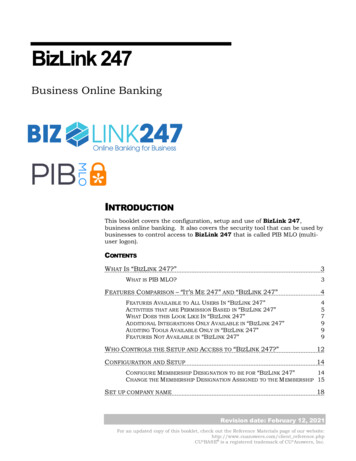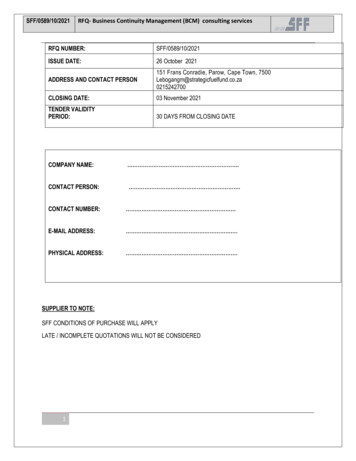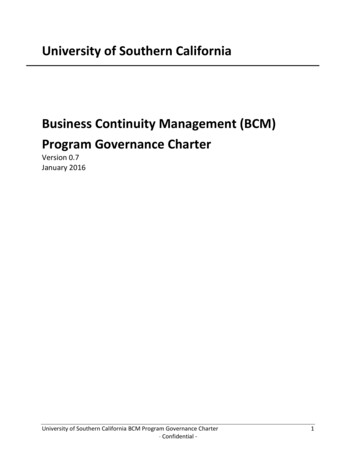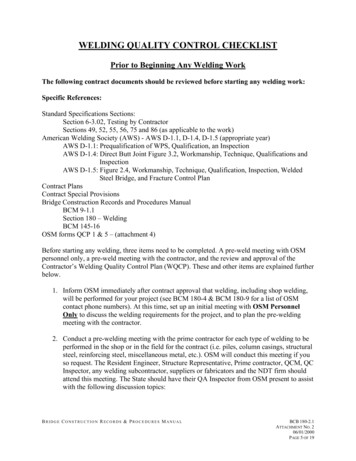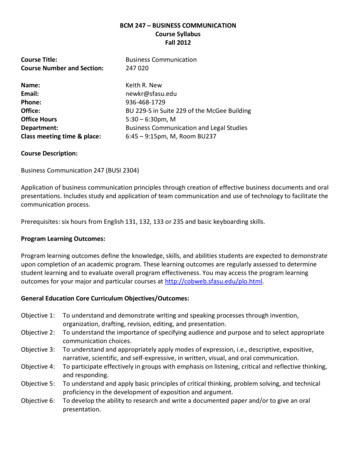
Transcription
BCM 247 – BUSINESS COMMUNICATIONCourse SyllabusFall 2012Course Title:Course Number and Section:Business Communication247 020Name:Email:Phone:Office:Office HoursDepartment:Class meeting time & place:Keith R. Newnewkr@sfasu.edu936-468-1729BU 229-S in Suite 229 of the McGee Building5:30 – 6:30pm, MBusiness Communication and Legal Studies6:45 – 9:15pm, M, Room BU237Course Description:Business Communication 247 (BUSI 2304)Application of business communication principles through creation of effective business documents and oralpresentations. Includes study and application of team communication and use of technology to facilitate thecommunication process.Prerequisites: six hours from English 131, 132, 133 or 235 and basic keyboarding skills.Program Learning Outcomes:Program learning outcomes define the knowledge, skills, and abilities students are expected to demonstrateupon completion of an academic program. These learning outcomes are regularly assessed to determinestudent learning and to evaluate overall program effectiveness. You may access the program learningoutcomes for your major and particular courses at http://cobweb.sfasu.edu/plo.html.General Education Core Curriculum Objectives/Outcomes:Objective 1:Objective 2:Objective 3:Objective 4:Objective 5:Objective 6:To understand and demonstrate writing and speaking processes through invention,organization, drafting, revision, editing, and presentation.To understand the importance of specifying audience and purpose and to select appropriatecommunication choices.To understand and appropriately apply modes of expression, i.e., descriptive, expositive,narrative, scientific, and self-expressive, in written, visual, and oral communication.To participate effectively in groups with emphasis on listening, critical and reflective thinking,and responding.To understand and apply basic principles of critical thinking, problem solving, and technicalproficiency in the development of exposition and argument.To develop the ability to research and write a documented paper and/or to give an oralpresentation.
Student Learning Outcomes:Upon successful completion of this course, the student should be able to:1. Apply business communication strategies and principles to prepare effective communication fordomestic and international business situations.2. Identify ethical, legal, cultural, and global issues affecting business communication.3. Utilize analytical and problem solving skills appropriate to business communication.4. Participate in team activities that lead to the development of collaborative work skills.5. Select appropriate organizational formats and channels used in developing and presenting businessmessages.6. Compose and revise accurate business documents using computer technology.7. Communicate via electronic mail, Internet, and other technologies.8. Deliver an effective oral business presentation.Text and Materials:Textbook for the course is: Lehman, C. M., DuFrene, D. D., (2013), BCOM4. South-Western Cengage Learning.ISBN-13: 978-1-133-56224-5 or ISBN-10: 1-133-56224-8.Course Requirements:This course will require writing assignments that will include the good news or positive message; the bad newsor negative message; the persuasive message, and a research-based report. Coverage will also includeemployment communication and team building activities. At least one oral presentation will be included in thecourse. At least two examinations must be administered.Other assignments may include secondary research, primary research, and additional assignments asdetermined by the instructor.Course Calendar:See Attached Course OutlineGrading Policy:Assignment/ActivityExaminations - 3 @ 100 points eachLetters, memorandums, and written messagesDocumented ReportQuizzes and other assignmentsOral PresentationApproximate total pointsPoints4003801002101001190% For This Section33.6%31.9%08.4%17.7%08.4%100%
Grading Scale:A 89.5% - 100%B 79.5% - 89.4%C 69.5% - 79.4%D 59.5% - 69.4%F below 59.5Attendance Policy:Students are expected to attend class as indicated in the SFASU General Bulletin.ATTENDANCE and PARTICIPATION are important; you should plan to attend every class.Attendance will be taken regularly, AND may be taken at any point during the class period.Perfect attendance for all course days will result in (2) points added to the students final average.Only (1) class missed will result in (1) points added to the students final average. Points will not beawarded to students who leave prior to class dismissal.Points may be deducted for students who do not actively participate in class. Extra credit points maybe awarded for students who positively impact class discussion.Students who miss three consecutive classes without official excuse will be "fired" from their teamsby the instructor. Access to this course in D2L will be denied until the student meets with theinstructor.Academic Integrity (A-9.1)Academic integrity is a responsibility of all university faculty and students. Faculty members promoteacademic integrity in multiple ways including instruction on the components of academic honesty, as well asabiding by university policy on penalties for cheating and plagiarism.Definition of Academic DishonestyAcademic dishonesty includes both cheating and plagiarism. Cheating includes but is not limited to (1) using orattempting to use unauthorized materials to aid in achieving a better grade on a component of a class; (2) thefalsification or invention of any information, including citations, on an assigned exercise; and/or (3) helping orattempting to help another in an act of cheating or plagiarism. Plagiarism is presenting the words or ideas ofanother person as if they were your own. Examples of plagiarism are (1) submitting an assignment as if it wereone's own work when, in fact, it is at least partly the work of another; (2) submitting a work that has beenpurchased or otherwise obtained from an Internet source or another source; and (3) incorporating the wordsor ideas of an author into one's paper without giving the author due credit. Please read the complete policy athttp://www.sfasu.edu/policies/academic integrity.asp.Withheld Grades Semester Grades Policy (A-54)Ordinarily, at the discretion of the instructor of record and with the approval of the academic chair/director, agrade of WH will be assigned only if the student cannot complete the course work because of unavoidablecircumstances. Students must complete the work within one calendar year from the end of the semester inwhich they receive a WH, or the grade automatically becomes an F. If students register for the same course infuture terms the WH will automatically become an F and will be counted as a repeated course for the purposeof computing the grade point average.
Students with DisabilitiesTo obtain disability related accommodations, alternate formats and/or auxiliary aids, students with disabilitiesmust contact the Office of Disability Services (ODS), Human Services Building, and Room 325, 468-3004 / 4681004 (TDD) as early as possible in the semester. Once verified, ODS will notify the course instructor andoutline the accommodation and/or auxiliary aids to be provided. Failure to request services in a timelymanner may delay your accommodations. For additional information, go ble Student BehaviorClassroom behavior should not interfere with the instructor’s ability to conduct the class or the ability of otherstudents to learn from the instructional program (see the Student Conduct Code, policy D-34.1).Unacceptable or disruptive behavior will not be tolerated. Students who disrupt the learning environmentmay be asked to leave class and may be subject to judicial, academic, or other penalties. This prohibitionapplies to all instructional forums, including electronic, classroom, labs, discussion groups, field trips, etc. Theinstructor shall have full discretion over what behavior is appropriate/inappropriate in the classroom. Studentswho do not attend class regularly or who perform poorly on class projects/exams may be referred to the EarlyAlert Program. This program provides students with recommendations for resources or other assistance thatis available to help SFA students succeed.Other Policies/Procedures for the InstructorUNPROFESSIONAL CONDUCT is unacceptable and includes:1) Use of Cell Phones, Pagers, etc. in class (advise instructor if you have an extenuatingcircumstance that would require monitoring your cell)2) Tardiness – is disruptive and shows a lack of respect for rights of others3) Inattentiveness – ( sleeping, talking among class members, working on activities unrelatedto class)4) Use of Profanity or insensitive languageASSIGNMENTS are Due on dates indicated with some uploaded in D2L. Assignments LATE will receiveNO CREDIT. Credit for late major assignments (if any) will be determined by PRIOR conference withthe professor. Tests and exam letters MAY NOT BE COMPLETED at times other than the scheduledtimes, unless the circumstances fall STRICTLY under the make-up GUIDELINES.A MAKE-UP TEST or EXAM LETTER may be scheduled ONLY if a serious illness (doctor appointmentsor visits to campus health center are NOT considered a serious illness), death in the immediatefamily, or official school business prevents you from completing a test or in-class writing lab AND ifyou notify the instructor within ONE CLASS DAY of the absence.PLAGIARISM is not acceptable. No points will be given for any assignment where plagiarism exists.Plagiarism includes copying information from another source (fellow student, magazine article,published text, etc.) without properly citing the source. Students agree that by taking this course allrequired papers may be subject to submission for textual similarity review to Turnitin referencedatabase solely for the purpose of detecting plagiarism of such papers. Use of the Turnitin service issubject to the Terms and Conditions of Use posted on the Turnitin.com site.ELECTRONIC MAIL AND DISCUSSION through D2L will be an integral part of the course. Thiscommunication link will provide a way to communicate with the instructor and other class members.
WRITTEN DOCUMENTS: Handwritten documents will not be accepted for credit. Assignments thatcontain inappropriate business topics and unacceptable language will receive no credit.LAB COURTESY: Violations of lab policies will result in the loss of points from the total semesterpoints, ranging from 5-50 per occurrence as determined by the instructor. These violations includechecking e-mail, playing games, accessing offensive web sites, working on unrelated assignments,and printing documents unrelated to class work.DISCLAIMER: This syllabus represents a “best” plan for the course; but, as with most plans, it issubject to change. Any necessary changes in this syllabus will be announced to the class.
BCM 247.020 (Mon. 6:45-9:15 pm)Business Communication – Mr. Keith New, InstructorCourse Outline – Fall 2012DATEMATERIAL TO BECOVEREDASSIGNMENT(due the following class periodunless otherwise noted)NOTESIntroduction, SyllabusChapter 1 -“Establishing aFramework forBusiness Communication”Chapters 2 “Focusing onInterpersonal and GroupCommunication”Chapter 5“CommunicatingElectronically”Chapter 3 “Planning Spokenand Written Messages”Chapters 4 “PreparingSpoken and WrittenMessages”In-class activity; In class assignment : Communication Barriers Chapter 1 review cardHW1 (due 9/10 by class time): Personal PowerPoint Activity entitled“Who I Am”Sep 24Exam 1 – Chs. 1-5Meet in Computer Lab 222HW4 (due 10/01 Good/neutral news letterOct 01Chapter 6Meet in Computer Lab 222Letter Exam 1 (Good NewsHW5 (due 10/8): Bad news letterletter)Chapter 6 review cardChapter 6 model docsOct 08Chapter 7Letter Exam 2 (Bad NewsLetter)Meet in Computer Lab 222HW6 (due 10/15): Persuasive letterChapter 7 review cardChapter 7 model docsOct 15Chapter 8Letter Exam 3 (PersuasiveLetter)Meet in Computer Lab 222Study for Exam-2, Chs. 6-8Chapter 8 review cardChapter 8 model docsOct 22Exam 2 – Chs. 6-8Meet in Computer Lab 222Aug 27Sep 10Sep 17Oct 29Nov 05Nov 12Nov 19Team Assignments; in-class activity - HW2: Team Agreement &topic selection (due at the end of class if all members present);HW3 (due 9/17 by class time)Oral PresentationsChapter 5 review cardChapter 5 model docsMemo Assignment (due 9/17 by class time)Chapter 3 review cardChapter 4 review cardChapter 9 “Understandingthe Report Process andIndividual Report Assignments tonightResearch Methods”Chapters 10 “Managing Dataand Using Graphics”Chapter 11 “Organizing andPreparing Reports andProposals”Chapter-12 “Designing and Study for Exam-3, Chs. 6-8Delivering BusinessPresentations”.Exam 3– Chs. 9-12Chapter 2 review cardChapter 9 Review cardand Docs - Style card/APA - Chapter 10review card and DocsChapter-11 Review cardAnd DocsChapter-12 Review cardand DocsMeet in Computer Lab 222Complete team presentationsNov 26Chapters 13 “Resumes andIndividual Report Assignments due tonightApplication Letters,”Meet in Computer Lab 222 : Resume and Application LetterDec 03Chapter 14 “Interviewingfor a Job and PreparingEmployment Messages”Meet in Computer Lab 222 : Ch. 14 “Interviewing for a Job and Chapter-14 Review cardand DocsPreparing Employment Messages”Dec 10Exam 4- Chs.13,14Meet in Computer Lab 222, M, 6:45-8:45p.m.Chapter-13 Review cardand Docs
BCM 247 - BUSINESS COMMUNICATION Course Syllabus Fall 2012 Course Title: Business Communication Course Number and Section: 247 020 Name: Keith R. New Email: newkr@sfasu.edu Phone: 936-468-1729 Office: BU 229-S in Suite 229 of the McGee Building Office Hours 5:30 - 6:30pm, M Department: Business Communication and Legal Studies Class meeting time & place: 6:45 - 9:15pm, M, Room BU237
